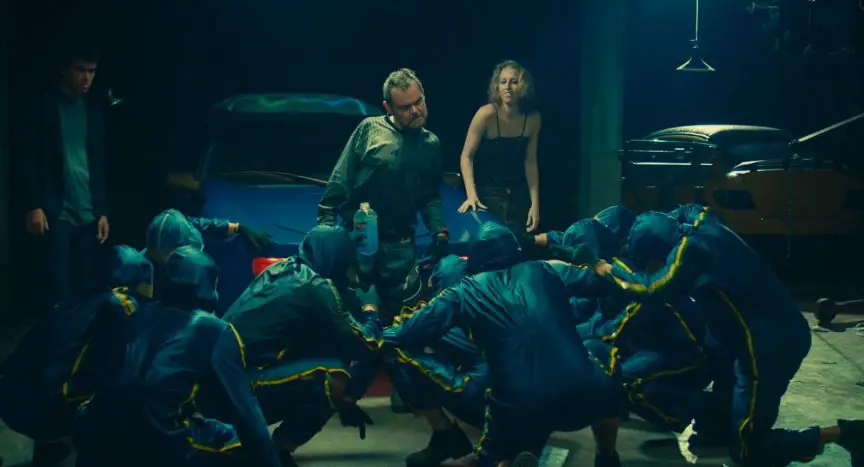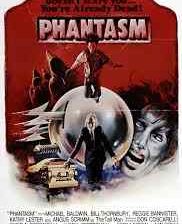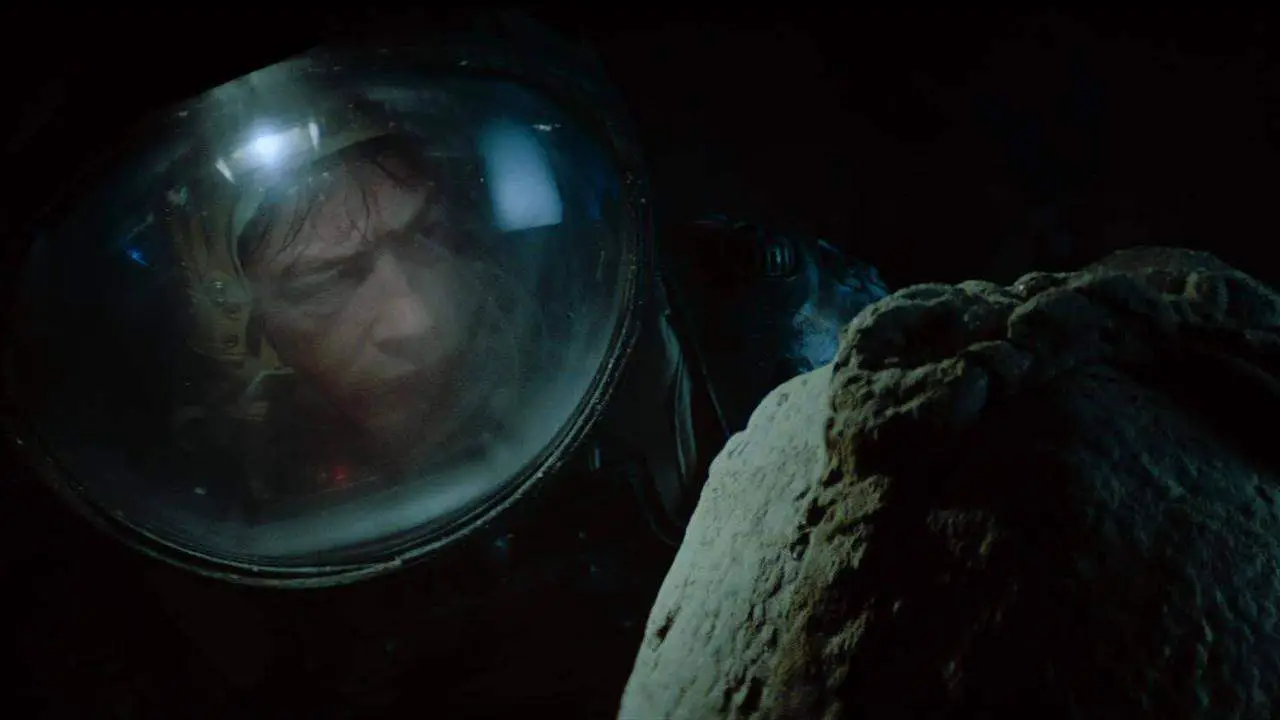In synopsis, King Car/Carro Rei is the stuff that midnight movie dreams are made of. Uno (Luciano Pedro Jr), was born in the back of his father’s taxi, which may explain why he’s had the lifelong ability to talk to cars. Uno and his eccentric Uncle Ze (Matheus Nachtergale) create the titular “King Car”. Unfortunately, King Car has some ideas of its own, and soon the pair’s good intentions place them at the center of a potentially apocalyptic battle of man versus sentient machines.
The beginning of the film immediately dashes those bonkers B movie expectations. The early beats are straight from a coming of age drama, with an 8 year old Uno spending most of his birthday playing alone in the garage. His ability to talk to cars seems more a quirky child’s off kilter choice of imaginary friend. Even on this supposedly festive occasion, there’s obvious tension between Uno’s parents, and there are no friends his own age at his humble celebration. Just his immediate family doing their best to try not to bring the disagreements into his special day, but not fully succeeding.
Unsurprisingly, the conflict culminates in a rather nasty fight regarding Uncle Ze’s place in the family, and the resulting effect on their finances. Less than pleased with the casual dismissal of her brother (who co owns their inherited home), Uno’s mother goes on an angry drive through town, not noticing her own son playing in the street nearby. The sentient car saves him from certain death, but Uno loses his mother in the resulting crash.
This bit of tragic backstory is suggested as the source of the simmering tensions between Uno and his father. Now college age, he has rejected the family business to study ecology and agriculture. Furious, Uno’s dad kicks him out of the house, and shortly afterward shuttles the eccentric Ze off of the property and into the garage at the fleet’s junkyard. Uno’s new classmates help him find a place to stay, and challenge his gearhead leanings with more ecologically friendly ideas, based in nature rather than technology.
The struggle to forge an identity of one’s own as a young adult really forms the core of the first act of the film, and the genre elements are reintroduced in a somewhat convoluted way. Uno’s father becomes ill, forcing him to return home and discover his ability to communicate with cars wasn’t merely childish whimsy. A conveniently introduced law to ban older cars from the road encourages Uno and Ze to rebuild his old vehicular BFF into a newer seeming model.
The process of the car restoration leads to both Ze finally discovering Uno’s special ability, and a reborn family business built around remodeling banned vehicles. Given the new law has destroyed the basic mobility and livelihood of many of the area’s less affluent residents, most of the townsfolk gleefully join in as the labor needed for this new venture. Everyone except Amora (Joelma Martins) and the rest of Uno’s college classmates, who are wary of both Uno’s sudden about face in regards to both his viewpoints, and the larger impact of untested technology.

Writer/director Renata Pinheiro shoots all of this in a very appealing style, all sharp edges bisected by slick, off black roads and faded teal skies. Uno’s Brazilian hometown is both freshly modern and humming with the vivid retro pop of a vintage postcard. Pinheiro’s extensive design background shows, as the aesthetic universe of her film is very carefully curated and thought out. This battle between old and new also makes a great visual underlining of the central narrative conflicts.
There are also some very interesting thematic questions about sustainability versus modernity, how the progress of the wealthy is often built on the oppression of the working class (even more topical given Brazil’s severe wealth inequality), and the ways in which the devices we use end up using us instead. Unfortunately, there’s just way too many ideas here to satisfyingly tackle in the allotted runtime, and the film suffers from the sheer volume of topics it’s attempting to cover.
Also See: Bacurau Smashes Colonialism [Blu-Ray Review]
The overstuffed narrative is further muddied by having to jockey for position with scenes that seem shoehorned in primarily for their visual potential. There’s a performance artist who ends up having a sexual relationship with King Car (more in line with 2020’s Jumbo than Cronenberg’s Crash), mind controlled mechanics doing choreographed dances in coveralls, and a sentient car shouting pseudo leftist manifestos to an adoring assembly line. Only that last bit is as delightfully daffy as the filmmakers were seemingly aiming for.
Also See: Christine is John Carpenter’s Unsung Love Story [Retrospective]
None of the performances are terrible, but the writing doesn’t give any of the actors much to work with. Tavinho Teixara in particular gives a smooth, lawful evil edge to his voiceover work as the car, a key component of selling the film’s impending mechanical rebellion. There’s just not enough breathing room in the script for any of the human figures to really engage with one another, or to have much of a character arc. Uncle Ze is more of a collection of eccentricities than a fully realized person. He starts at mad scientist, and then just shifts to full on madness. Uno is the portrait of the road to hell being paved with good intentions (and possibly naivety). Everyone (the unflaggingly idealistic Amora being the most prominent example), is more of an avatar of a specific ideology rather than three dimensional people for the audience to connect with.
The end result is that King Car is a film that is both more and less than the sum of its (many) parts. The human drama is too thin to be affecting on its own, but there isn’t enough forward momentum or commitment to high concept weirdness to make the film something that dedicated fans of offbeat cult cinema could cheer. There’s the framework of something solid buried under here, but King Car‘s scattered focus lacks the horsepower to make the overall film much of a ride.
WICKED RATING: 4.5/10
Director(s): Renata Pinheiro
Writer(s): Sergio Oliveira, Renata Pinheiro, Leo Pyrata
Stars: Luciano Pedro Jr, Matheus Nachtergale, Tavinho Teixara
Release date: July 16, 2021
Studio/Production Company: Aroma Filmes
Country: Brazil
Language: Portuguese
Run Time: 97 Minutes







